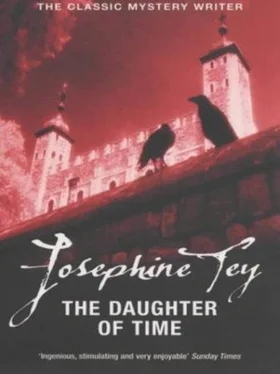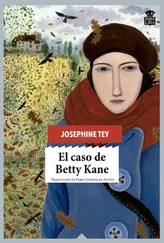The young man looked abashed, smiled nervously, propped the spectacles on his nose with a long thin forefinger, cleared his throat, and said:
‘Mr Grant? My name is Carradine. Brent Carradine. I hope I haven’t disturbed you when you were resting.’
‘No, no. Come in, Mr Carradine. I am delighted to see you.’
‘Marta – Miss Hallard, that is – sent me. She said I could be of some help to you.’
‘Did she say how? Do sit down. You’ll find a chair over there behind the door. Bring it over.’
He was a tall boy, hatless, with soft fair curls crowning a high forehead and a much too big tweed coat hanging unfastened round him in negligent folds, American-wise. Indeed, it was obvious that he was in fact American. He brought over the chair, planted himself on it with the coat spread round him like some royal robe and looked at Grant with kind brown eyes whose luminous charm not even the horn-rims could dim.
‘Marta – Miss Hallard, that is – said that you wanted something looked up.’
‘And are you a looker-upper?’
‘I’m doing research, here in London. Historical research, I mean. And she said something about your wanting something in that line. She knows I work at the B.M. most mornings. I’d be very pleased, Mr Grant, to do anything I can to help you.’
‘That’s very kind of you; very kind indeed. What is it that you are working on? Your research, I mean.’
‘The Peasants’ Revolt.’
‘Oh. Richard II.’
‘Yes.’
‘Are you interested in social conditions?’
The young man grinned suddenly in a very unstudent-like way and said: ‘No, I’m interested in staying in England.’
‘And can’t you stay in England without doing research?’
‘Not very easily. I’ve got to have an alibi. My pop thinks I should go into the family business. It’s furniture. Wholesale furniture. You order it by mail. Out of a book. Don’t misunderstand me, Mr Grant; it’s very good furniture. Lasts for ever. It’s just that I can’t take much interest in furnishing-units.’
‘And, short of Polar exploration, the British Museum was the best hideaway you could think of.’
‘Well, it’s warm. And I really do like history. I majored in it. And well, Mr Grant, if you really want to know, I just had to follow Atlanta Shergold to England. She’s the dumb blonde in Marta’s I mean: in Miss Hallard’s play. I mean she plays the dumb blonde. She’s not at all dumb, Atlanta.’
‘No, indeed. A very gifted young woman indeed.’
‘You’ve seen her?’
‘I shouldn’t think there is anyone in London who hasn’t seen her.’
‘No, I suppose not. It does go on and on, doesn’t it. We didn’t think – Atlanta and me – that it would run for more than a few weeks, so we just waved each other goodbye and said: See you at the beginning of the month! It was when we found that it was going on indefinitely that I just had to find an excuse to come to England.’
‘Wasn’t Atlanta sufficient excuse?’
‘Not for my pop! The family are very snooty about Atlanta, but Pop is the worst of the bunch. When he can bring himself to mention her he refers to her as “that young actress acquaintance of yours.” You see, Pop is Carradine the Third, and Atlanta’s father is very much Shergold the First. A little grocery store on Main Street, as a matter of fact. And the salt of the earth, in case you’re interested. And of course Atlanta hadn’t really done very much, back in the States. I mean, on the stage. This is her first big success. That is why she didn’t want to break her contract and come back home. As a matter of fact it’ll be quite a fight to get her back home at all. She says we never appreciated her.’
‘So you took to research.’
‘I had to think of something that I could do only in London, you see. And I had done some research at college. So the B.M. seemed to be what you call my cup of tea. I could enjoy myself and yet show my father that I was really working, both at the same time.’
‘Yes. It’s as a nice an alibi as ever I met with. Why the Peasants’ Revolt, by the way?’
‘Well, it’s an interesting time. And I thought it would please Pop.’
‘Is he interested in social reform, then?’
‘No, but he hates kings.’
‘Carradine the Third?’
‘Yes, it’s a laugh, isn’t it. I wouldn’t put it past him to have a crown in one of his safe-deposit boxes. I bet he takes out the parcel every now and then and sneaks over to Grand Central and tries it on in the men’s washroom. I’m afraid I’m tiring you, Mr Grant; gabbing on about my own affairs like this. I didn’t come for that. I came to—’
‘Whatever you came for, you’re manna straight from heaven. So relax, if you’re not in a hurry.’
‘I’m never in a hurry,’ the young man said, unfolding his legs and laying them out in front of him. As he did it his feet, at the far extremity of his long limbs, touched the bedside table and shook the portrait of Richard III from its precarious position, so that it dropped to the floor.
‘Oh, pardon me! That was careless of me. I haven’t really got used to the length of my legs yet. You’d think a fellow would be used to his growth by twenty-two, wouldn’t you.’ He picked up the photograph, dusted it carefully with the cuff of his sleeve, and looked at it with interest. ‘ Richardus III. Ang. Rex. ,’ he read aloud.
‘You’re the first person to have noticed that background writing,’ Grant said.
‘Well, I suppose it isn’t visible unless you look into it. You’re the first person I ever met who had a king for a pin-up.’
‘No beauty, is he.’
‘I don’t know,’ said the boy slowly. ‘It’s not a bad face, as faces go. I had a prof. at college who looked rather like him. He lived on bismuth and glasses of milk so he had a slightly jaundiced outlook on life, but he was the kindest creature imaginable. Is it about Richard that you wanted information?’
‘Yes. Nothing very abstruse or difficult. Just to know what the contemporary authority is.’
‘Well, that should be easy enough. It isn’t very far from my own time. I mean my research period. Indeed, the modern authority for Richard II – Sir Cuthbert Oliphant – stretches over both. Have you read Oliphant?’ Grant said that he had read nothing but schoolbooks and Sir Thomas More.
‘More? Henry VIII’s Chancellor?’
‘Yes.’
‘I take it that that was a bit of special pleading!’
‘It read to me more like a party pamphlet,’ Grant said, realising for the first time that that was the taste that had been left in his mouth. It had not read like a statesman’s account; it had read like a party throwaway.
No, it had read like a columnist. Like a columnist who got his information below-stairs.
‘Do you know anything about Richard III?’
‘Nothing except that he croaked his nephews, and offered his kingdom for a horse. And that he had two stooges known as the Cat and the Rat.’
‘What!’
‘You know: “The Cat, the Rat, and Lovel Our Dog, Rule all England under a Hog”.’
‘Yes of course. I’d forgotten that. What does it mean, do you know?’
‘No, I’ve no idea. I don’t know that period very well. How did you get interested in Richard III?’
‘Marta suggested that I should do some academic investigating, since I can’t do any practical investigating for some time to come. And because I find faces interesting she brought me portraits of all the principals. Principals in the various mysteries she suggested, I mean. Richard got in more or less by accident, but he proved the biggest mystery of the lot.’
‘He did? In what way?’
‘He is the author of the most revolting crime in history, and he has the face of a great judge; a great administrator. Moreover he was by all accounts an abnormally civilised and well-living creature. He actually was a good administrator, by the way. He governed the North of England and did it excellently. He was a good staff officer and a good soldier. And nothing is known against his private life. His brother, perhaps you know, was – bar Charles II – our most wench-ridden royal product.’
Читать дальше












